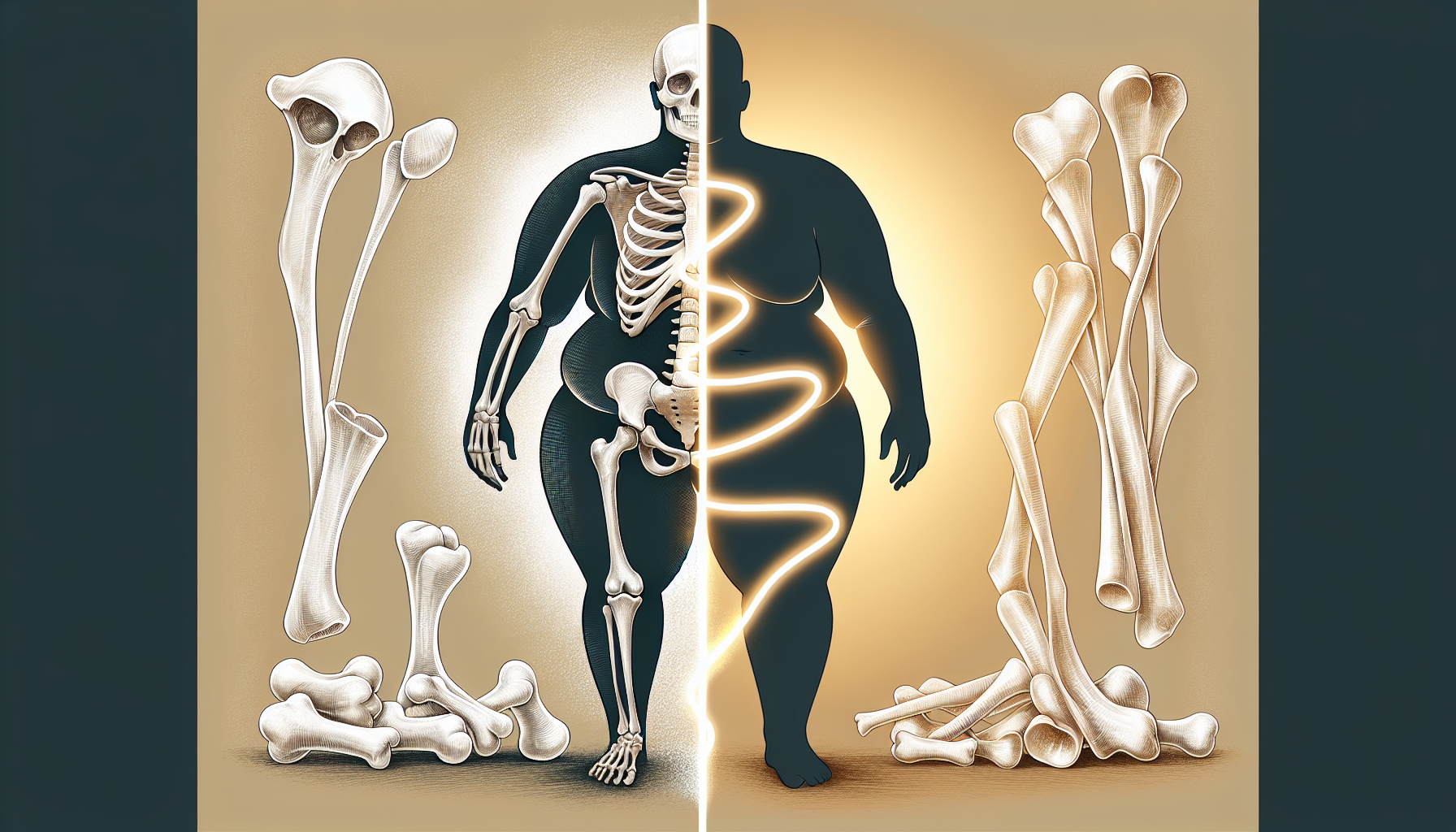Obesity is a prevalent health issue that affects millions of people globally. While it is well-known for its link to cardiovascular diseases and diabetes, its impact on bone health is often overlooked. Understanding the complex relationship between obesity and bone health is crucial for developing strategies to maintain strong and healthy bones throughout life.
The Paradox of Obesity and Bone Health
Contrary to common assumptions, obesity does not always confer protection against bone loss. Although higher body weight is associated with increased bone density due to the mechanical load on the skeleton, the relationship between obesity and bone health is not straightforward. In fact, adipose tissue, particularly when present in excess, can have a detrimental effect on bone quality.
The Role of Inflammatory Factors
Obesity is characterized by chronic low-grade inflammation, which can negatively impact bone remodeling—a process where old bone tissue is replaced by new tissue. Fat cells release inflammatory cytokines that can promote bone resorption, the breakdown of bone tissue by cells called osteoclasts. This can lead to a decrease in bone density and an increased risk of fractures.
Hormonal Imbalance
Adipose tissue influences the production and regulation of hormones such as estrogen and leptin, which play a role in bone metabolism. While estrogen is protective of bone health, obese individuals often experience hormonal imbalances that can lead to bone loss. Moreover, leptin, typically higher in obese individuals, may have a complex effect on bone, potentially leading to bone fragility despite higher bone mass.
The Impact of Fat Distribution
The distribution of body fat also plays a role in bone health. Visceral fat, which is stored around the organs, is more metabolically active and harmful than subcutaneous fat, which is stored under the skin. Excessive visceral fat can lead to the secretion of substances that negatively affect bone density.
The Role of Nutrition in Obesity and Bone Health
Nutrition is a critical factor in both obesity management and bone health. Individuals with obesity often have a diet low in essential nutrients necessary for bone strength, such as calcium and vitamin D. It is important to tackle bone health issues with nutritional interventions, ensuring a balanced intake of macro and micronutrients to support both weight management and bone density.
Exercise: A Dual-Edged Sword
Physical activity is beneficial for weight loss and improving bone density. However, the type of exercise matters. Weight-bearing exercises are generally recommended for bone health, but individuals with obesity must also consider the potential for joint stress. Engaging in regular exercise for bone health maintenance that is tailored to reduce joint impact can promote bone strength without causing harm.
Addressing the Challenges
For individuals with obesity, addressing bone health requires a multifaceted approach. It’s essential to consider factors such as diet, exercise, and hormonal balance. Moreover, understanding the connection between metabolic health and bone density is key to developing effective strategies for improving bone health.
Medical Interventions
Medical interventions might be necessary in some cases to manage obesity and its impact on bone health. Medications can help regulate metabolism and weight, while surgical options like bariatric surgery have been shown to affect bone density and require careful monitoring.
Nutritional Supplements
For individuals struggling to receive adequate nutrients from their diet alone, medication and supplements can play a role in providing the necessary support for bone health. Supplements such as calcium, vitamin D, and magnesium can help improve bone density when used under the guidance of healthcare professionals.
Lifestyle Modifications
Lifestyle changes are the cornerstone of managing obesity and improving bone health. Incorporating a balanced diet, regular exercise, and avoiding smoking and excessive alcohol consumption can have a significant impact. It’s also important to understand the significance of lifestyle in bone density conservation for long-term health.
External Resources for Further Information
To further explore the nuances of obesity and bone health, here are some niche resources that provide valuable insights:
- A comprehensive study on the effects of obesity on bone mineral density offers an in-depth look at the complex relationship between body weight and bone health.
- Guidelines on nutrition and physical activity for bone health provided by the Nutrition Society, which delve into the dietary components critical for maintaining strong bones.
- Research on the impact of visceral fat on bone mineral density presents findings on how different types of body fat influence bone health.
Conclusion
The impact of obesity on bone health is multifaceted and complex. While higher body weight can lead to increased bone density, the associated metabolic and inflammatory factors can adversely affect bone quality. Addressing the challenges posed by obesity requires a comprehensive approach that includes dietary management, appropriate exercise, medical interventions when necessary, and lifestyle modifications. By understanding and addressing these factors, individuals can take proactive steps to maintain bone health while managing their weight.
For anyone dealing with obesity or concerned about their bone health, it’s essential to seek the guidance of healthcare professionals. With the right support and information, it’s possible to navigate these challenges successfully and promote long-term health and well-being.



